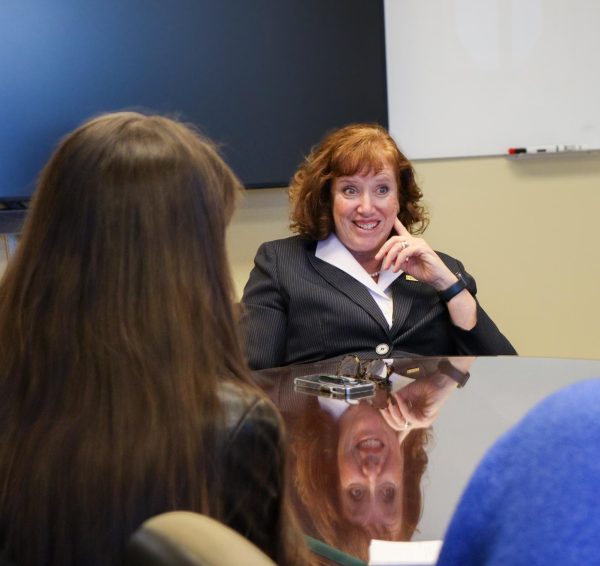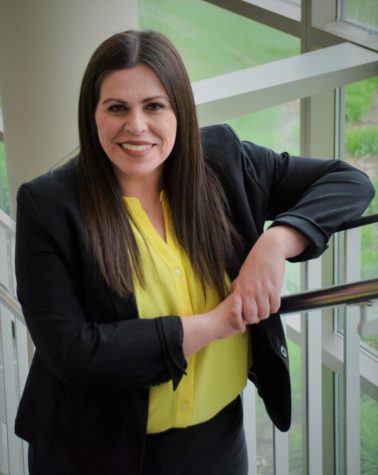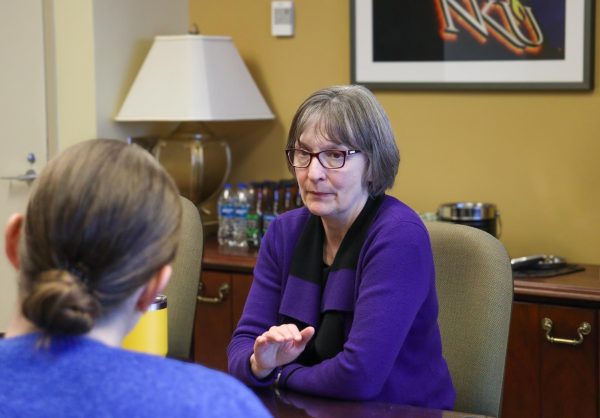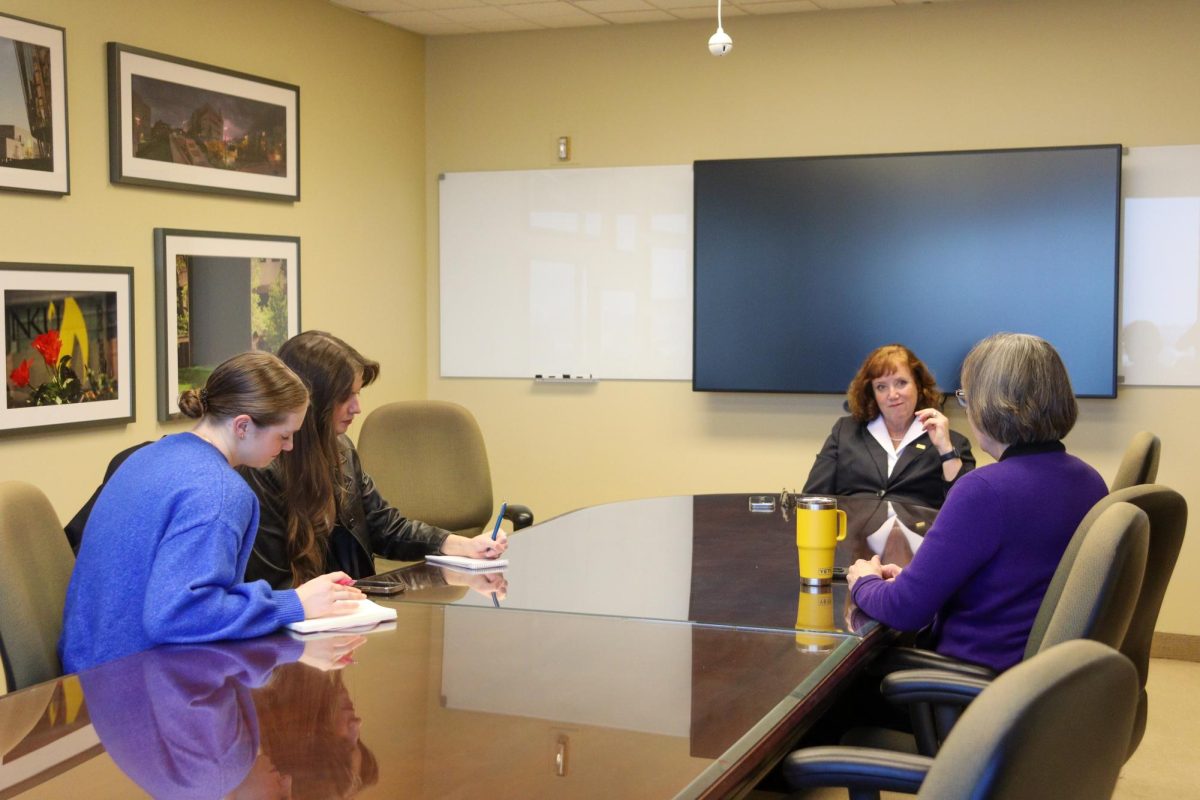One look at Northern Kentucky University’s leadership roles reveals the prominence of women.
From the president to the provost to the athletic director and beyond, NKU has women in nearly every facet of its organizational chart.
There is no other institution in the state to simultaneously have a female president, provost, athletic director, Faculty Senate president, Staff Congress president, faculty regent, staff regent or student regent. NKU has a woman leading each of these positions and more.
Doing a double take
Provost Diana McGill talked about the double take people tend to do when they notice the presence of women in university leadership.
“It is statistically odd to have all of those positions be any one identity, right? It just so happens we notice it more when it’s all women versus all men,” McGill said. “When we see all women we go, ‘Whoa, that’s really odd.’ But I’ve been here a long time, and I never saw people go, ‘Well that’s really odd. The president and the provost are men.’”
Both President Cady Short-Thompson and McGill spoke about their career experiences and the changes they have seen when it comes to women in leadership.
“I can’t tell you how many board rooms that I was the only woman at the table at each of my institutions,” Short-Thompson said.
Paying it forward
One commonality in both of their stories of climbing the ladder—no matter how linear or nonlinear—was the people who opened doors for them along the way.

Short-Thompson and McGill both mentioned the influence of former NKU Provost Gail Wells on where they are today. Wells began working at the university in the 1970s. For more than 35 years, she served in various positions, from a professor of mathematics to the dean of the College of Arts and Sciences and eventually provost.
McGill spoke about the mentorship she received from Wells, like invitations to serve on search committees and learn more about the university. Each time, McGill said, the roles brought her out of her comfort zone.
“Each time you learned a little bit more about the roles of the university, but also about yourself,” the provost said.
Wells sent congratulatory messages to both Short-Thompson and McGill when they began their current positions, they shared.
“I don’t know how to be anyone other than who I am…”
The president and provost duo couldn’t be more different when it comes to their backgrounds and interests, but they believe that is what makes them a strong team.
Short-Thompson’s background is in communication—specifically political communication—and she knew by her junior year of college she wanted to work in higher education.
McGill studied chemistry and didn’t think she wanted any part in higher education. She just wanted to be in a research lab.
“My husband wanted to stay in the area, and I took a position here reluctantly. I didn’t think I wanted to teach, but after my first year I knew I would never leave,” McGill said.
There is no one right way to be a woman in leadership, and that is exemplified by leaders at NKU.
“I don’t know how to be anyone other than who I am, and I’m too busy to try to be anyone other than who I am. I think this university allows all the people who come into it, whether they’re students or employees, to live into who they are and what they’re good at,” Short-Thompson said.
From freshman senator to Student Government president
Senior Lucy Burns serves as both the Student Government Association (SGA) president and the student regent. After being a part of Student Council at her high school in Murray, Ky, she knew she wanted more leadership opportunities in college.
As an environmental science and integrative studies major, Burns came to NKU with the mindset that she would try her hand at everything and see what stuck.
She quickly rose in the ranks of Student Government, from a freshman senator to vice president to now president. Burns said she has been given an opportunity to sit at the table and encourage real change at the university.

A big part of that opportunity is her relationship with the president and provost. Burns and her SGA Vice President Collin Jarrell meet with Short-Thompson regularly to discuss new NKU developments.
“I would say [Short-Thompson and McGill] are a combination of transformational leaders and then very practical—on the ground, how to get this done—type of leaders,” Burns said. “Cady [Short-Thompson] has come in since October of last year and has been like, ‘This is the direction we’re going. The university will be healthy, the university will have a balanced budget, the university will be active in the community.”
The reason behind the leaders
When it comes to the presence of female leadership on campus, Burns attributed this to the youth of the university. An institution that is just over 55 years old can attract more fresh, modern perspectives in its leadership, the senior said.
“I feel like because we’re younger, we are more open to anyone who wants to take the opportunities that we have,” Burns said.
The president and provost echoed a similar sentiment. While the university is past its “teenage years,” as McGill called it, the age of the university is one factor that sets NKU apart.
“A new, growing place I think lets more people come to the table to share their talents,” Short-Thompson said. “I can’t help but think maybe that has been one of the ways that we’ve all been encouraged to lead and serve.”
The president also referenced the demographics of students in higher education. At NKU, more than 65% of students are women.
The majority of faculty members are also women. Short-Thompson attributed this partially to the prominence of the female-dominated healthcare program at NKU—and the absence of a typically male-dominated engineering program.
“I think that over the years, you find that more and more women are climbing the ladders of their career, and you see it across all these different disciplines,” Short-Thompson said. “It’s interesting the number of people all at once. It’s historic, there’s no question.”
Honoring the past and present of NKU Athletics
A transformational leader who paved the way while NKU was in its younger years is former coach and Athletic Director (AD) Jane Meier. She held her position for 21 years, beginning in 1988. Meier was not only the first female AD at NKU but one of the first in the country.

Current AD Christina Roybal takes direct inspiration from Meier and views her as a leader who left the university ready for other women, especially in the position she now holds.
“Because Jane Meier had been an AD here before, the institution isn’t afraid of having another woman leader to lead Athletics,” Roybal said.
Having reached her current position in what she considers a very nonlinear path, she wants other future leaders to feel good about wherever they are coming from. People get to these careers in many different ways, and Roybal’s desire is for no one to feel lesser for a background that is different from the norm.
In her climb up the ladder, Roybal emphasized the importance of providing support for other women.
“As women, we have to lift each other up. Lift as you rise,” she said.
She went on to add that it was not only other women who lifted her up, but male colleagues as well. Having anyone who is willing to be a champion for your independence and leadership while taking a step back to let you grow is key, according to Roybal.
Empowering educators
For Dr. Jacqueline Emerine, working her way into leadership has come naturally. Emerine is a communications professor and also serves as president of the Faculty Senate.
She has been a part of Faculty Senate from nearly the beginning of her NKU career, which started almost 20 years ago.
One thing Emerine is focused on is improving the morale and energy of the university for faculty members. After two budget crises and the COVID-19 pandemic hitting the university in less than 10 years, she recognized things have changed a lot in higher education.
“When Cady first came [in 2023], we had that energy again and I think that’s kind of fizzled off a little bit, so we’re hoping to really revitalize that and bring it back,” Emerine said. “But when you put 50% of your classes online, you have professors who are only teaching online, and so the vibrancy of the university has kind of…dulled.”
There are elements the Faculty Senate president wants to work on to improve this vibrancy. For example, faculty members used to get free access to the Campus Recreation Center before budget cuts.
Another sore spot is parking. All full-time faculty and staff members are required to pay the same price for an annual parking permit: $429. That’s regardless of the salary they receive.
Staff Congress President Vicki Cooper said this is something that must be made more equitable for all faculty and staff.
“The person who’s making $25,000 has to pay the same amount for parking as somebody who makes $500,000,” Cooper said. “It’s a big difference.”
Both Cooper and Emerine said they are working to implement a pay scale for parking to make it more fair for everyone—and to encourage more faculty and staff members to be on campus.
Another thing the Faculty Senate and Staff Congress presidents agree on is what women bring to the table when it comes to leadership: empathy. Whether they are facing issues that only affect one person or that affect 500 people, they hope to lead with understanding.
Short-Thompson added that she believes being a mother is another trait that guides her leadership style.
“I am mindful of people’s full lives and appreciative of the fact that flexibility is valuable to all people,” the president said.

McGill said she is careful to think about equity in her decision-making because she has seen decisions at times that did not seem to be equitable.
She is quick to tell fellow faculty and staff members not to apologize for having a busy life or having a family to take care of.
“Stop apologizing. You wouldn’t apologize if you were going home for choir practice, so don’t apologize. Don’t even tell me. You just have to go home—it’s fine,” she said.
Celebrating the present and planning for the future
To Short-Thompson, an ideal group of leaders includes those from all walks of life with all kinds of life experiences. She emphasized this doesn’t necessarily mean having all women, but that happened organically for NKU.
Seeing others who look like you and have paved the path before you is essential to preparing the next generation of leaders, Emerine shared.
“Kentucky has been behind in lots of areas, especially when it comes to female leadership,” Emerine said. “It’s also important for other junior faculty to see women in these roles. It’s important for students to see us in these roles… You can see that if this is something I want to do, it’s obviously possible.”
McGill sees a future where a room full of women leading so many different facets of a university is no longer a surprise but simply a norm.
“In 20 years or 30 years, my hope for us is that we never think it’s odd anymore,” the provost said.
This hope does not just include women in leadership but a mix of many different people who are willing to bring in new ideas and challenge the status quo.
“It makes the conversation deeper, and that’s what a team does,” McGill said. “You build a team with a lot of different perspectives, I think that makes it good.”


